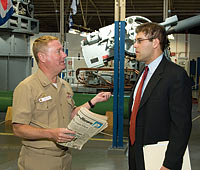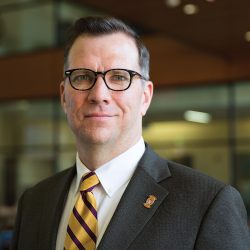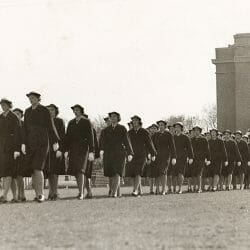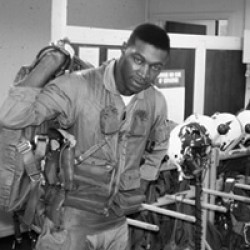Strategic Study Group
Web-based history course reaches out to members of the military.

History professor Jeremi Suri (right) talks with Captain Ken Auten, professor of naval science and commander of the naval ROTC program at UW-Madison, after a lecture on grand strategy. Last summer, Suri gave an online course in grand strategy designed to accommodate active-duty personnel. Photo: Shawn Harper
Attention, Mr. and Mrs. Armed Forces and all the ships at sea — Jeremi Suri wants to teach you. Last summer, the UW history professor launched an online course called U.S. Grand Strategy, designed to appeal to active- service members of the military.
Officially listed as History 434, the course ran from June to August. Though most of the 130 students who enrolled were undergrads, twenty-two were officers in the armed forces, some of whom were serving in Iraq and Afghanistan, as well as one stationed on an aircraft carrier.
“We were trying to bridge the chasm that exists between scholarship and practice,” says Suri, adding that the officers were “thinking about applications, about how to use this knowledge” — and that they brought the real world into scholarship.
To develop the course, Suri teamed with one of his doctoral students, Scott Mobley PhDx’13, a retired naval captain and former professor of naval science at UW-Madison. In 2007, Suri had used the Web to teach alumni for a course on American foreign relations since 1941. Where Suri brought academic expertise, Mobley worked to develop Suri’s previous online class into something with appeal for a military audience.
“In its earlier incarnations, the class was about foreign policy,” Mobley says. “We altered its focus to center on strategy, in addition to policy — that is, to how the country exercises material, human, and cultural power to help it achieve its long-term objectives — because that would more closely address the needs and interests of military students.”
The course drew on online technologies, such as audio recordings of lectures and downloadable readings, and the class was divided into smaller sections for weekly online discussions.
“It started as posting essay responses, but it became a blog — a really fantastic blog,” says Suri, who led the section that included the military personnel and found them to be an invigorating presence in his virtual classroom.
Few people feel the effects of America’s strategic efforts more intimately than do those in the armed forces, which gives them a unique perspective. “They were ruthless in wanting to get to core issues,” Suri says. “They don’t want to muck around. And they’re very, very concerned about being better leaders.”
Published in the Winter 2009 issue



Comments
No comments posted yet.